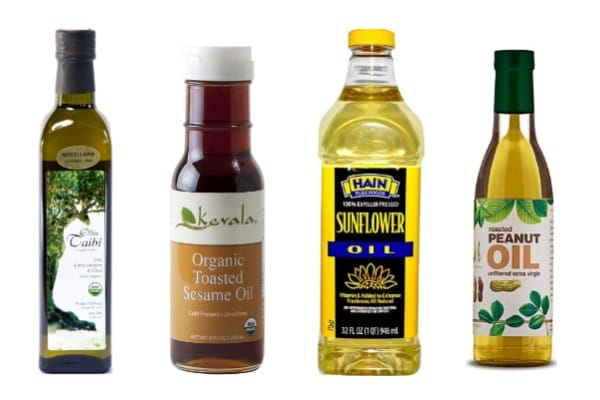
Plant-Based Oils: A Simple Swap to Enhance Longevity
Plant-based oils are increasingly recognized as a healthful alternative in our daily diets, especially when considering the significant health benefits associated with their use. A recent study indicates that making a dietary swap, such as replacing butter with plant-based oils, can reduce the risk of premature death by an impressive 17 percent. This shift to oils like olive, canola, and soybean not only supports cardiovascular health but also lowers mortality rates from chronic diseases like cancer. The impact of diet on longevity is profound, demonstrating that even small changes, like incorporating more plant-based oils daily, can extend one’s lifespan. Embracing these oils instead of traditional ingredients like butter may contribute to a healthier, longer life—allowing you to enjoy delicious meals without compromising your well-being.
In the realm of nutrition, using botanical oils represents a modern approach to enhancing dietary quality. These alternatives to traditional dairy fats serve not only as flavor enhancers but also offer a host of health advantages. By opting for oils derived from plants, such as olive oil, individuals can experience a positive shift in their well-being. Such substitutions can contribute to reduced risks associated with serious health issues, emphasizing the crucial role that dietary choices play in overall wellness. As the conversation around dietary quality evolves, integrating these nourishing oils can lead to improved health outcomes and longevity.
The Health Benefits of Olive Oil
Olive oil, renowned for its exceptional health benefits, is a key player in the Mediterranean diet, which is associated with longevity and reduced health risks. Packed with monounsaturated fats, olive oil helps lower bad cholesterol levels while promoting heart health. This dietary swap, from butter to olive oil, not only enhances flavor but significantly contributes to overall well-being. Studies indicate that individuals who regularly consume olive oil have a lower risk of cardiovascular diseases and certain types of cancer, reflecting its strong protective effects.
Moreover, the health benefits of olive oil extend beyond cardiovascular advantages. Research has shown that this versatile oil possesses anti-inflammatory properties due to its rich polyphenol content. These compounds play a pivotal role in fighting oxidative stress and inflammation, further contributing to longevity. By incorporating olive oil into meals, individuals can observe substantial improvements in their health markers, showcasing the profound impact of diet on longevity and quality of life.
Reduce Your Risk of Premature Death with Plant-Based Oils
Substituting butter with plant-based oils like olive, canola, and soybean oil can lead to monumental health transformations, particularly in reducing the risk of premature death. A recent study highlighted a striking 17 percent decrease in mortality risk when individuals replaced butter with these healthy oils. This dietary swap not only promotes healthier fat consumption but also reduces harmful saturated fats found in butter, which have been linked to increased mortality rates.
By embracing plant-based oils, you’re not just making a healthier food choice, but you’re also contributing to a significant public health message. This dietary shift can prevent numerous chronic diseases that commonly contribute to premature death, including heart disease and certain cancers. The evidence is clear: integrating plant-based oils into daily cooking may extend life expectancy and enhance overall health, making it a vital consideration for anyone looking to improve their dietary habits.
Impact of Diet on Longevity
The relationship between diet and longevity is a topic of growing research interest, with mounting evidence suggesting that our food choices profoundly affect our lifespan. Health professionals recommend diets rich in plant-based oils, whole grains, fruits, and vegetables, as these have been consistently associated with longer life and lower disease risk. The dramatic findings from recent studies emphasize that even modest dietary adjustments, such as replacing butter with healthier oils, can yield significant benefits, reducing risks of chronic diseases that shorten lifespans.
Additionally, the role of dietary fats cannot be overlooked when examining their impact on health. Diets high in saturated fats, like those from butter, have been shown to increase mortality risk, whereas unsaturated fats found in plant-based oils are associated with better overall health and longevity. This clear distinction highlights the importance of making informed dietary swaps. Ultimately, such changes can make a substantial difference in life expectancy and quality of life.
The Science Behind Dietary Swaps
Understanding the science behind dietary swaps helps clarify why certain food choices can lead to improved health outcomes. The transition from butter to plant-based oils is underpinned by the types of fats consumed; while butter is high in saturated fats, plant-based oils predominantly contain healthier unsaturated fats. Numerous studies demonstrate that diets rich in unsaturated fats reduce inflammation and support heart health, which in turn contribute to a longer, healthier life.
Researchers revealed in their studies that daily dietary swaps can be a simple yet effective strategy to enhance health. By substituting just 10 grams of butter with an equal amount of plant-based oil, participants showed marked improvements in health markers, reducing the overall risk of mortality. These findings reinforce the notion that adopting such dietary changes isn’t just a trend but a crucial step toward preventing chronic diseases and ensuring longevity.
How To Easily Incorporate Plant-Based Oils
Incorporating plant-based oils into your diet can be seamlessly integrated into your daily cooking routine. Start by using olive oil or canola oil as a base for salad dressings, marinades, or as a cooking oil for sautéing vegetables. These oils not only enhance the flavor of dishes but also pack a nutritional punch, making it easy to enrich meals with heart-healthy fats while eliminating saturated fat from butter.
Furthermore, consider exploring different ways to utilize plant-based oils in various cuisines. For example, using sesame oil in Asian stir-fries or avocado oil in Mediterranean dishes can add unique flavors and health benefits. By embracing a variety of plant-based oils, you can diversify your diet while simultaneously reaping the health rewards associated with these healthier fat sources. This simple approach paves the way for more nourishing meals and improved overall health.
The Role of Saturated Fats in Health
Saturated fats, primarily found in animal products such as butter, craft a complex relationship with our health. While they are an essential part of a balanced diet, excessive intake of saturated fats has been linked to numerous negative health outcomes, including an increased risk of heart disease and premature death. Scientific studies advocate for a balanced approach to fat consumption, highlighting the importance of minimizing butter intake while opting for healthier plant-based oils.
Understanding the effects of dietary choices concerning saturated fats is crucial for public health recommendations. Transitioning away from saturated fat sources like butter towards plant-based oils can lead to healthier cholesterol levels and a reduced risk of chronic diseases. As more individuals become aware of these associations, the shift towards dietary swaps is gaining momentum, underscoring the importance of informed food choices for longevity and overall health.
Public Health Implications of Dietary Changes
The implications of dietary changes on public health are monumental, particularly when we observe widespread dietary habits. With research showing that substituting butter with plant-based oils could significantly reduce the risk of chronic diseases and premature death, it becomes vital for health organizations to advocate for these dietary swaps. Educating the public on the health benefits of such shifts can contribute to substantial decreases in healthcare costs related to diet-related illnesses.
Furthermore, public health campaigns highlighting easy dietary substitutions can empower individuals to make healthier food choices. Strategies such as community workshops, online resources, and cooking classes focused on utilizing plant-based oils can foster a cultural shift toward healthier eating patterns. By promoting the idea that simple changes in daily dietary habits can profoundly affect health outcomes, public health advocates can make a lasting impact on community health.
The Future of Plant-Based Diets
As interest in plant-based diets continues to surge, the future appears bright for incorporating healthier dietary practices into the average person’s lifestyle. Studies such as the recent one highlighting the life-extending benefits of replacing butter with plant-based oils are paving the way for innovative approaches to nutrition. With increasing awareness of the health benefits associated with plant oils, more individuals and families are likely to explore and adopt plant-based diets.
Moreover, the food industry is responding to this trend by creating more accessible plant-based products. From ready-to-use plant-based oils to innovative cooking alternatives, consumers are finding it easier to incorporate these healthier options into their meals. In the coming years, as more research emphasizes the value of plant-based diets in promoting health and longevity, it’s anticipated that the shift towards plant-based eating will only strengthen, ultimately benefiting public health at large.
Frequently Asked Questions
What are the health benefits of olive oil compared to butter?
Olive oil, a popular plant-based oil, is rich in monounsaturated fats and antioxidants, making it a heart-healthy alternative to butter. Studies indicate that replacing butter with olive oil can lead to a reduced risk of overall mortality, particularly from cardiovascular diseases and certain cancers. Incorporating more olive oil into your diet, instead of butter, can enhance longevity and promote better health outcomes.
How can a dietary swap to plant-based oils reduce the risk of premature death?
Research shows that substituting butter with plant-based oils daily can reduce the risk of premature death by up to 17%. This dietary swap decreases the intake of saturated fats found in butter and increases the consumption of beneficial unsaturated fats found in oils like canola, soybean, and especially olive oil, which are linked to lower mortality rates.
Is replacing butter with plant-based oils a significant dietary swap for longevity?
Yes, replacing butter with plant-based oils is a significant dietary swap for longevity. Studies have found that individuals who consume more plant-based oils experience lower mortality rates. Just a small daily swap, like using plant-based oils in cooking and salad dressings, can yield long-term health benefits and potentially extend life.
What impact do dietary fats have on longevity and health?
Dietary fats greatly influence health and longevity. Plant-based oils, rich in unsaturated fatty acids, contribute positively to heart health and reduce the risk of chronic diseases. In contrast, butter, which is high in saturated fats, has been linked to increased mortality rates. Thus, choosing plant-based oils over butter can have a profound impact on overall health.
How can I incorporate plant-based oils into my daily diet effectively?
To effectively incorporate plant-based oils into your daily diet, consider using them for cooking, baking, and dressings. Replace butter with oils such as olive, canola, or soybean oil in recipes. Even small changes, like using oil instead of butter on toast or in stir-fries, can promote better health and help lower the risk of premature death.
Why should I swap butter for plant-based oils based on nutritional studies?
Nutritional studies highlight that swapping butter for plant-based oils can reduce the risk of chronic diseases, particularly cancer and cardiovascular conditions. This dietary swap not only helps in maintaining heart health but is also associated with a 17% lower risk of premature death, making it a crucial change for long-term wellness.
| Key Findings | Details |
|---|---|
| Replacement of Butter with Plant-Based Oils | Substituting butter with plant-based oils could reduce the risk of premature death by 17%. |
| Health Benefits | Higher consumption of plant-based oils like soybean, canola, and olive oil is linked to lower mortality rates, particularly from cancer and cardiovascular diseases. |
| Study Details | The study analyzed data from over 200,000 participants followed for more than 30 years. |
| Author Statements | Researchers emphasize that even small reductions in butter intake and increases in plant-based oil consumption can lead to meaningful health benefits. |
| Study Limitations | The study’s participants were mainly health professionals, which may not represent the general U.S. population. |
Summary
Plant-based oils should be a significant consideration for anyone looking to improve their health and longevity. By replacing butter with oils such as olive or soybean oil, individuals can potentially lower their risk of premature death by up to 17%, according to recent studies. Incorporating more plant-based oils into your diet not only promotes better heart health but also lowers risks associated with chronic diseases. As research continues to explore the health benefits of these oils, it becomes increasingly clear that they are a vital component of a healthy lifestyle.


